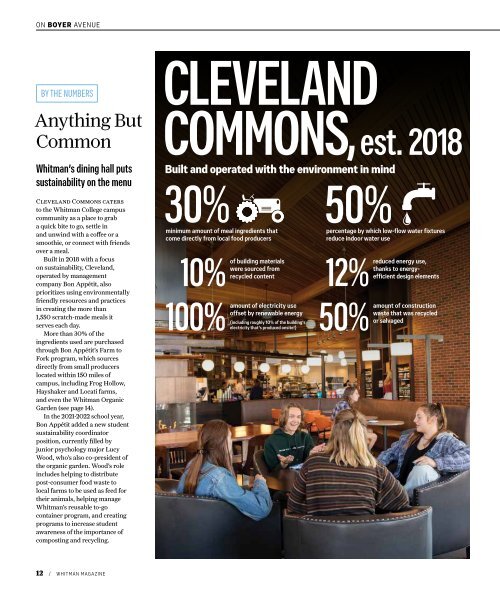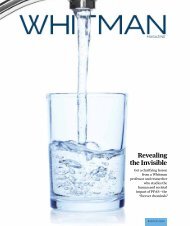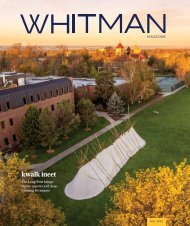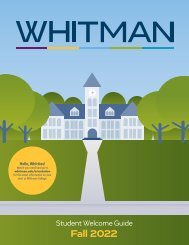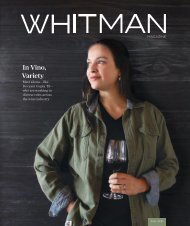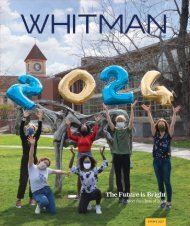You also want an ePaper? Increase the reach of your titles
YUMPU automatically turns print PDFs into web optimized ePapers that Google loves.
ON BOYER AVENUE<br />
BY THE NUMBERS<br />
Anything But<br />
Common<br />
<strong>Whitman</strong>’s dining hall puts<br />
sustainability on the menu<br />
CLEVELAND<br />
COMMONS, est. 2018<br />
Built and operated with the environment in mind<br />
Cleveland Commons caters<br />
to the <strong>Whitman</strong> <strong>College</strong> campus<br />
community as a place to grab<br />
a quick bite to go, settle in<br />
and unwind with a coffee or a<br />
smoothie, or connect with friends<br />
over a meal.<br />
Built in 2018 with a focus<br />
on sustainability, Cleveland,<br />
operated by management<br />
company Bon Appétit, also<br />
prioritizes using environmentally<br />
friendly resources and practices<br />
in creating the more than<br />
1,550 scratch-made meals it<br />
serves each day.<br />
More than 30% of the<br />
ingredients used are purchased<br />
through Bon Appétit’s Farm to<br />
Fork program, which sources<br />
directly from small producers<br />
located within 150 miles of<br />
campus, including Frog Hollow,<br />
Hayshaker and Locati farms,<br />
and even the <strong>Whitman</strong> Organic<br />
Garden (see page 14).<br />
In the 2021-<strong>2022</strong> school year,<br />
Bon Appétit added a new student<br />
sustainability coordinator<br />
position, currently filled by<br />
junior psychology major Lucy<br />
Wood, who’s also co-president of<br />
the organic garden. Wood’s role<br />
includes helping to distribute<br />
post-consumer food waste to<br />
local farms to be used as feed for<br />
their animals, helping manage<br />
<strong>Whitman</strong>’s reusable to-go<br />
container program, and creating<br />
programs to increase student<br />
awareness of the importance of<br />
composting and recycling.<br />
minimum amount of meal ingredients that<br />
come directly from local food producers<br />
of building materials<br />
were sourced from<br />
recycled content<br />
amount of electricity use<br />
offset by renewable energy<br />
(including roughly 10% of the building’s<br />
electricity that’s produced onsite!)<br />
percentage by which low-flow water fixtures<br />
reduce indoor water use<br />
reduced energy use,<br />
thanks to energyefficient<br />
design elements<br />
amount of construction<br />
waste that was recycled<br />
or salvaged<br />
12 / WHITMAN MAGAZINE


